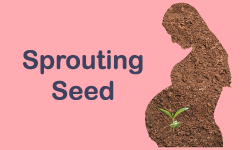Frequently asked questions
Apart from being in a certain age bracket (23-32 years), oocyte donors at Sprouting Seed:
- Must be of a low to healthy body weight according to their height
- Following a healthy lifestyle (diet, exercise)
- In good physical and mental health
- Non-smokers and free from substance abuse
There are several factors that determine the success of donor egg IVF, including the age of the egg donor and the clinic’s protocols. Generally, success rates for donor egg IVF are higher than for traditional IVF. Success rates range from 40% to 60% per embryo transfer.
Traditional IVF involves using a woman’s own eggs, which are retrieved and fertilized with sperm in the lab. The resulting embryos are then transferred to her uterus.
Donor egg IVF, on the other hand, uses eggs from a donor. The eggs are fertilized with sperm (from a partner or a sperm donor) and the embryos are transferred to the recipient’s uterus. This approach is often used when the recipient has age-related fertility issues, poor egg quality, or other reproductive challenges.
Frequently asked questions
Yes. As with any medical procedure, egg donation has possible side effects and risks. Many women feel little or no discomfort during the donation cycle.
You will receive a slight IV sedation during the egg retrieval process but there might be some discomfort afterwards. Every individual has a different experience, most of which are not alarming.
A study shows that egg donation procedures can have an impact on a woman’s health. Repeated egg donations and stimulation can have harmful effects.
If everything goes well one can donate more than once, however due to safety reasons it should not exceed 6 times. However as per the Government of India , a woman can donate eggs only once in her lifetime.
4 hr. bed rest is advised depending on each individual’s case
One of the basic requirements for being an egg donor is to be between the ages of 21-35 and have a low to healthy BMI, usually between 18 to 29.
The exact number of eggs that are retrieved during a cycle varies, but is generally around 7.
The donor egg program replaces the gamete of the female partner with a donor egg,. However the sperm and uterus is of the genetic ( intending) parent.
Very often it is not clear why the embryos do not develop in the womb properly but it could be caused by one of these reasons
It could be chromosome problems – many healthy-looking embryos have defective chromosomes. Or it could be because of the poor blood flow to the womb or any implantation problems in the uterus. There could also be a problem with the sperm quality.
From the day you are chosen by a recipient, to the day of your egg retrieval is approximately 2 1/2 months. The calendar for egg donation cycles also depends on your availability and the timing of your menstrual cycle.
The ideal age for an egg donor is between the ages of 20 and 30. Hence, we at Sprouting Seed Egg Bank , try and take good young donors with proven fertility to improve the results of donor egg IVF. Sometimes it may take up to a few months to get a good donor who should match the profile of the intended parent.
After menopause, a woman no longer produces eggs and thus cannot become pregnant naturally. But although eggs succumb to this biological clock, pregnancy is still possible using a donor egg. The embryo formed with the help of donor egg can be transferred in the intending mother and pregnancy can be achieved.
DETAILED CASE HISTORY OF DONOR
- Age/Marital status/Education/Occupation
- Menstrual & Obstetric history (how many pregnancies she has had, when was the last pregnancy, any history of recurrent abortions, etc. to determine fertility potential)
- Family history (history of any genetic/congenital abnormalities in any family member)
- Personal history(habits like using tobacco, smoking, drinking, what is the contraceptive being used)
Preselection Ultrsound Assesment
To look for donor’s ovarian reserve and presumption of ovum retrieval after hormonal ovarian stimulation
